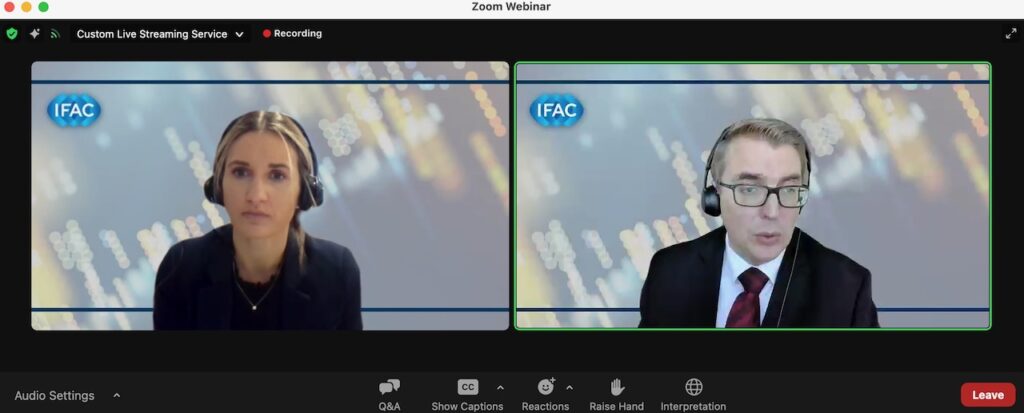Can the profession meet the demand for sustainability reporting?
A webinar hosted by IFAAC and IAAER on 7 February 2024 launching a literature review, Educating Accountants for a Sustainable Future. It highlights key themes relevant to education, learning and development, and insights into how the profession can meet sustainability reporting demands.

View the webinar on YouTube
Educating accountants to advance sustainability
With the increasing demand for sustainability and ESG reporting, accountants have a vital role to play in advancing sustainability through their work. However, this requires building capabilities through effective education and professional development. Erica Neumann shared insights from her research on equipping aspiring and professional accountants with the required knowledge, skills and behaviours. Her presentation and Q&A covered several key themes around competencies, educational strategies, challenges, and the interplay between academia and practice.
Key competencies for accountants
A number of key competencies emerged from the literature as most relevant for sustainability accounting.
Critical thinking and problem-solving
Critical thinking and problem-solving skills are the primary competencies identified in the literature. They help accountants to assess risks, quantify non-financial information, and translate it into financial statement data. While this is an existing competency, due to the pace of change in sustainability reporting and assurance, we need accountants to understand its importance.
An important aspect is critical self-assessment. That is the ability to be aware of one’s own biases and consider them in the analysis of a situation.
Systems-thinking
Systems-thinking is seeing interconnections between sustainability issues and their financial impacts. One area talked about consistently in the literature is an understanding of sustainability metrics, identification of risks and proposing innovative solutions by translating qualitative risks into quantitive metrics on the financial statements.
Habits of systems thinkers include exploring cause-effect relationships, considering unintended consequences, distinguishing the circular nature of complex cause-effect relationships, and being able to see the whole picture.
Interpersonal skills
Interpersonal skills are crucial for collaborating across disciplines to understand sustainability metrics. Again, this is already expected of accountants, but in this context, we need students who can engage in an interdisciplinary way, particularly with metrics they are unfamiliar with. Increasingly, skills such as empathy and compassion are required.
Adaptability and flexibility
The tolerance for ambiguity is key — the ability to apply foundational accounting knowledge to new types of data and new reporting requirements. It requires an ability to tolerate and respond to uncertainty.
It requires a willingness to supplement and adapt current skills and competencies within a sustainability context. This is likely to be most challenging for the existing workforce of practising accountants.
Technological capability
Finally, an ability to understand, assess and use technology to achieve sustainability objectives across various disciplines. It will also require handling large data sets and analysing non-financial data.
Education strategies
The educational approaches for aspiring accountants differ from those applicable to those already in practice.
For aspiring accountants, a key finding is that combining different educational experiences is beneficial. A mix of formal (curricular), informal (extra-curricular), and informal (work experience) provides a holistic foundation.
For practising accountants, professional firms acknowledge that staff need resources and incentives to develop their skills. There’s been a significant increase in skills-focused education and rapid training programs that align with the rapid pace of change.
An important theme was the need for collaboration between academia and practice to build sustainability skills. Firms are investing in partnerships with universities. However, accounting education also relies on practice to provide experiential opportunities that develop critical, adaptable thinking.
Challenges in developing sustainability capabilities
Several challenges were highlighted regarding developing sustainability capabilities. Accounting education faces constraints around resources, curriculum capacity, and the lack of consensus on content.
In conclusion, developing the knowledge, skills, and behaviours for sustainability accounting requires a joint effort between academia and practice. Building key competencies through integrative education while overcoming resource and perception challenges will empower accountants to advance sustainability goals through their work.
Further reading and resources
IFAC (2024) Educating Accountants for a Sustainable Future. Available at: https://www.ifac.org/knowledge-gateway/preparing-future-ready-professionals/publications/educating-accountants-sustainable-future. Accessed 7 February 2024.
IFAC (2024) Webinar resources: slide deck and recording. Available at: https://www.ifac.org/events/ifac-and-iaaer-webinar-educating-accountants-sustainable-future. Accessed 7 February 2024.
About IFAC
IFAC (the International Federation of Accountants) is the global organisation for the accountancy profession. It is dedicated to serving the public interest by strengthening the profession and contributing to developing strong international economies. IFAC comprises 180 members and associates in more than 135 jurisdictions, representing millions of professional accountants in public practice, education, government service, industry, and commerce.
About IAAER
IAEER (the International Association for Accounting Education and Research) was founded in 1984 with the mission to promote excellence in accounting education and research on a worldwide basis and to maximize the contribution of accounting academics to the development and maintenance of high quality, globally recognized standards of accounting practice.
© AccountingCafe.org



